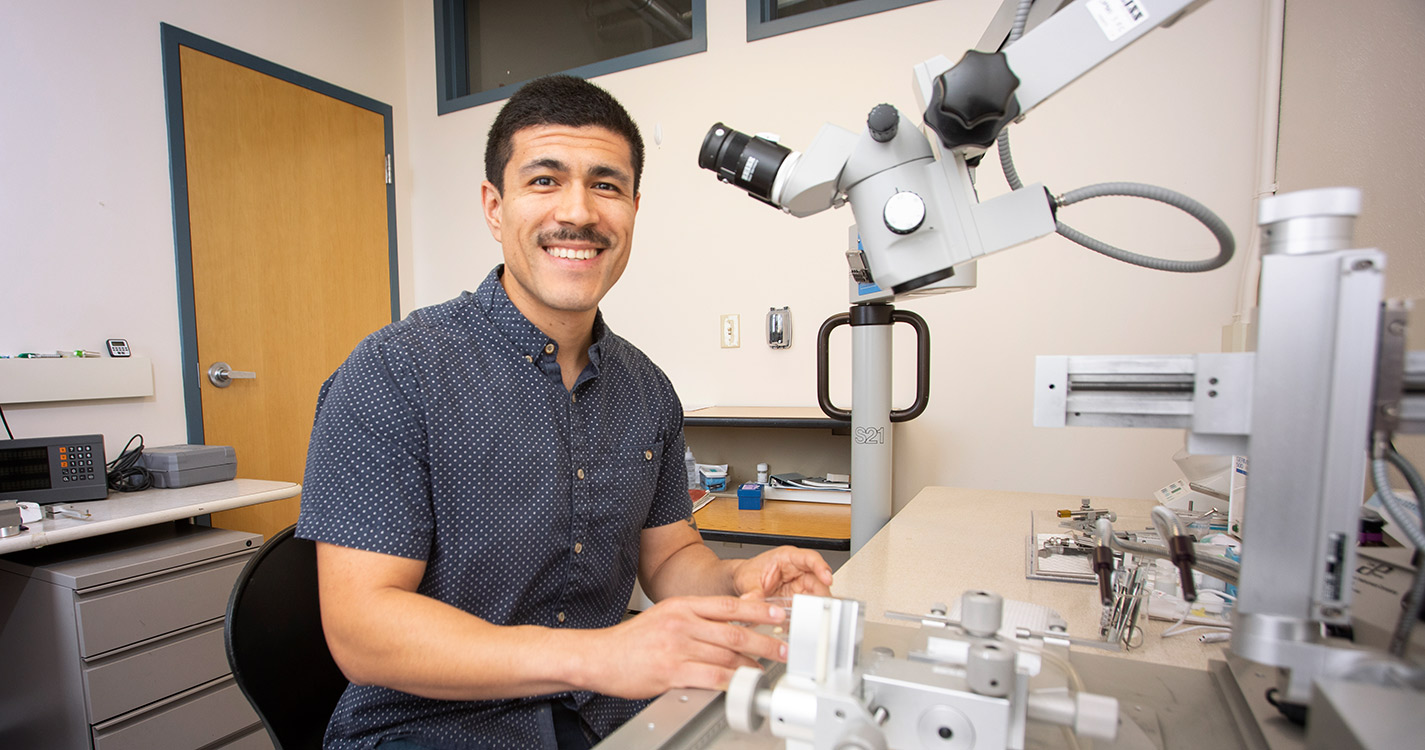In Alfredo Zuniga’s first week as a postdoctoral fellow at the University of Texas, he relied on old notes from his Willamette biology lab to teach students.
Despite defending his PhD thesis in neuroscience at Oregon Health and Sciences University in Portland just two months earlier, Zuniga ’12 returned to a procedure for polymerase chain reaction he’d learned his sophomore year.
Step-by-step instructions from Assistant Professor of Biology Jason Duncan on how to make multiple copies of genes provided him exactly what he needed, he said.
“I’ve come full circle,” he said. “All of the things I learned as an undergraduate I’m being asked to teach now, and I wouldn’t have been able to do it without Duncan’s lab.”
New footing
Zuniga’s path to neuroscience wasn’t obvious or guaranteed — least of all to himself.
A first generation student, Zuniga attended the college access program Willamette Academy seeking support for his future. He found the mentoring and tutoring assistance he needed, as well as unexpected encouragement to apply for a scholarship that he used toward Willamette University.
Already familiar with Willamette’s campus through the academy, Zuniga’s interest in science flourished. By his second year, he was working on his own project in Duncan’s lab after offering to help, and it went beyond lab work — instead of simply learning about genes from a textbook, Zuniga was manipulating the genes of the fruit fly Drosophila, generating novel mutations in a gene that he discovered were required for the correct function of neurons.
Over the next 18 months, Duncan trained Zuniga in a one-to-one lab setting. They worked shoulder-to-shoulder on procedures ranging from the production of genetically-modified fruit flies to microscopic imaging of defective nerve cells. The work was perfect for Zuniga, who grew restless in class and was happier to forge his own discoveries than hear about the accomplishments of others.
Zuniga said he could never receive this level of individual attention in a class, let alone at a larger university, and it made a difference — he stayed at Willamette.
“At a bigger school, I would have fallen through the cracks,” he said. “I was not the best student, but the professors were so willing to let me pick their brains and be guides for me. Because of my relationships with them, I was able to progress.”
Collaboration that works for students, faculty
Although this connection may appear to be unique, it’s representative of the education many students receive at Willamette, Duncan said.
Under the best of circumstances, the interest of both parties is served through collaboration — students learn to behave, think and write like biologists so they can contribute to faculty research, while faculty receive data that passes the highest standards.
“We go out of our way to make sure our students are exceptionally trained because they’re going to be producing data we want to use,” said Duncan, who attended Zuniga’s dissertation at OHSU. “I think when students leave, they have a really good sense of not only how to do things, but how to do things correctly and precisely.”
Zuniga said he learned many techniques from Duncan that he routinely used at OHSU while he studied addiction and the way drugs affect someone’s mood, behavior and memory. At University of Texas at Austin, he recently started genotyping animals and used protocols he learned from Duncan his junior year, he said. But best of all, he’s on a constant path of discovery.
What fulfills him most as a researcher is being able to continuously ask questions about the things that interest him, he said.
“I’ve always been a curious person, but now I can be curious all the time,” he said.


